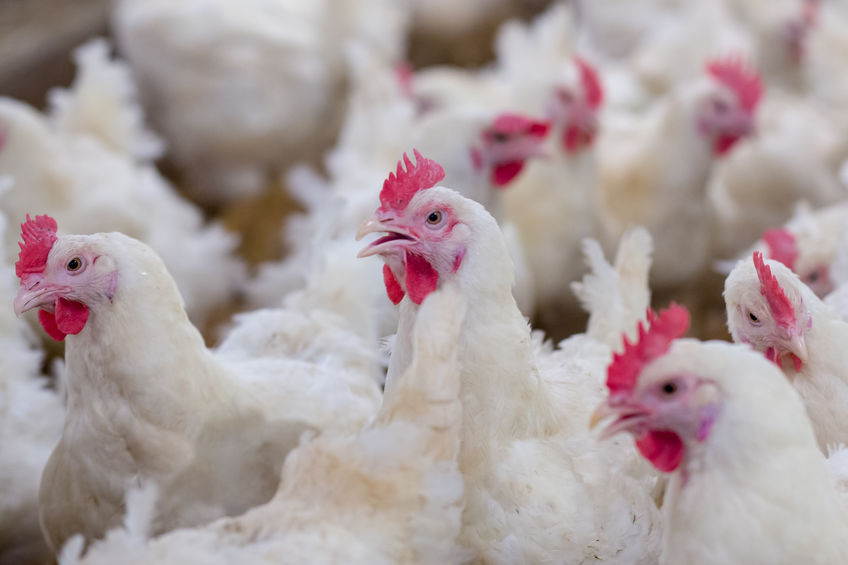
Farmers have been told to ensure the highest levels of biosecurity following a series of outbreaks of infectious laryngotracheitis, commonly known as ILT, in Northern Ireland.
A total of 30 outbreaks have been reported in the last two months in the region, affecting both egg producers and broiler units.
Northern Ireland's Department of Agriculture, Environment and Rural Affairs (DAERA) says it does not have a breakdown of units involved.
“We do not hold the number of birds affected as the department is not currently taking any disease control actions.
"Suffice to say that it is a mix of egg production units and birds,” a DAERA spokesman explained.
It is thought that hundreds of thousands of birds have been caught up in the outbreaks.
Both the Ulster Farmers’ Union (UFU) and the British Free Range Egg Producers’ Association (BFREPA) is urging farmers to ensure high biosecurity standards.
DAERA has pointed to litter as the likeliest cause of disease spread: “ILT affects poultry, causing severe respiratory problems, increased mortality and production loss,” it said.
“Excellent bio-security measures are absolutely vital in reducing the risk of ILT spread. Litter has been identified as a key risk factor in infection spread.
"We are urging industry to keep litter trailers covered and store litter for as long as practically possible before spreading it.”
Unlike avian influenza, the authorities are not imposing restrictions on movement or ordering culling of birds.
"Whilst it is a notifiable disease in Northern Ireland, DAERA considers it a production disease and therefore no restrictions or actions at flock level are being carried out,” said the spokesman.
“The department will continue to provide support to the poultry industry by providing practical advice through the various communication channels.
“Bio-security advice is available on the DAERA web page and for immediate disease text notifications please sign up to DAERA text alert service – text ‘BIRDS’ to 67300.
“ILT cannot pass from poultry to human - there are no implications for food safety or human health.”
Robert Gooch, chief executive of BFREPA, said the association was very concerned about the growing outbreaks of ILT and advised all members to maintain the highest levels of biosecurity.
“As it is thought that ILT is mainly spread via poultry litter, members should be vigilant around the movement and spreading of muck and litter in their vicinity,” he said.
UFU deputy president William Irvine explained that ILT was extremely infectious, with symptoms including coughing, sneezing and increased mortality.
"While the disease isn’t as life-threatening to birds as avian influenza, with flocks normally recovering after ten days of infection, it can still impact a farm business significantly. It will greatly reduce production, creating financial implications."
He said bio-security was vital to prevent the disease from spreading and to protect all flocks and farm businesses across Northern Ireland.
All poultry and bird keepers needed to review and heighten their bio-security where necessary, and all movement in and out of bird enclosures should be minimised.
Mr Irvine added that footwear should be cleaned before and after visiting birds, farms kept clean and tidy, hard surfaces regularly disinfected and rats and mice controlled.
“We urge all bird keepers to keep a close eye on flocks for symptoms. Any suspicion of disease or increased mortality needs to be reported to their vet or local divisional veterinary office immediately,” he said.
“The registration of all birds within Northern Ireland is key to controlling disease outbreaks such as ILT in Northern Ireland.
"I cannot stress enough how important it is for backyard keepers as well as poultry farmers to ensure their flock is registered with DAERA.
"Backyard keepers are those who have birds, regardless of how many, residing on their premises for personal use. This includes hens housed in gardens.
"Registration does not only apply to poultry farmers and the only exception to registration is pet birds that live inside the home.
"All other birds need to be registered and if they are not, this should be done as soon as,” said William Irvine.
The Poultry Industry Federation of Northern Ireland has written to farmers warning about the disease and detailing measures that should be taken to protect their birds.
“ILT is a herpes virus infection of poultry,” it said. “The effects of this disease are largely lethargy, swollen eyes and acute respiratory distress. They are often heard to snick or screech and become dull and apathetic. Feed intake is reduced and therefore production drops and the infection can give rise to mortality.
"Transmission between farms may occur by airborne particles or fomites, which are materials which are likely to carry infection, such as people, clothes, equipment, trays etc.”
However, like DAERA, it warned that the major means of transmission was through transportation of litter from an infected site, litter being spread on land or even passing other clean sites.
“It is very specifically a virus of chickens so it’s unlikely to be carried by other bird species and, as a herpes virus, it has the ability to persist in the bird’s body, in an inactive state, but to then become active again during periods of stress when the immune system is compromised.
"During these periods of renewed activity, known as recrudescence, the bird will again shed potentially infectious virus particles which can cause reinfection of naive birds,” said the federation.
“This makes it a difficult virus to control on multi-age farms but, thankfully, it is less resistant outside the bird and can be inactivated by heat which is why allowing the litter or manure to remain in situ is useful, as it essentially acts as a compact heap which creates a significant level of heat.”
The federation said that disinfectants were also useful to control the virus and good cleaning and disinfection after an outbreak was essential.
